| Listing 1 - 10 of 14 | << page >> |
Sort by
|
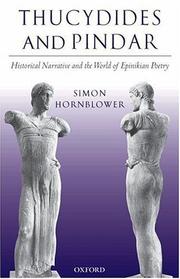
ISBN: 0199298289 9780199298280 9780199249190 0199249199 0191719420 9786610905096 0191530352 9786612199653 128219965X 1280905093 1435623703 9780191530357 9781282199651 Year: 2006 Publisher: Oxford ; New York : Oxford University Press,
Abstract | Keywords | Export | Availability | Bookmark
 Loading...
Loading...Choose an application
- Reference Manager
- EndNote
- RefWorks (Direct export to RefWorks)
Simon Hornblower demonstrates a thematic and literary kinship between Thucydides, one of the greatest of the ancient Greek historians, and Pindar, one of the greatest Greek poets who specialized in celebratory odes for victors in the Olympic Games.
Dichters [Griekse ] --- Poets [Greek ] --- Poètes grecs --- Poètes grecs anciens --- Influence (Literary, artistic, etc.) --- Laudatory poetry, Greek --- Olympic games (Ancient) --- Narration (Rhetoric) --- Olympic games (Ancient) in literature. --- Odes, Greek --- Greek language --- Athletes in literature. --- Rhetoric, Ancient. --- Influence littéraire, artistique, etc. --- Poésie élogieuse grecque --- Jeux olympiques de l'Antiquité --- Narration --- Jeux olympiques de l'Antiquité dans la littérature --- Odes grecques --- Grec (Langue) --- Sportifs dans la littérature --- Rhétorique ancienne --- History --- History and criticism. --- Style. --- Histoire --- Histoire et critique --- Style --- Thucydides --- Thucydides. --- Pindar --- Literary style. --- Influence. --- Greece --- Grèce --- Historiography. --- Historiographie --- Influence littéraire, artistique, etc. --- Poésie élogieuse grecque --- Jeux olympiques de l'Antiquité --- Jeux olympiques de l'Antiquité dans la littérature --- Sportifs dans la littérature --- Rhétorique ancienne --- Grèce --- Greek poetry --- History and criticism --- Historians --- Ancient rhetoric --- Classical languages --- Greek rhetoric --- Latin language --- Latin rhetoric --- Greek odes --- Ancient Olympic games --- Olympics --- Rhetoric --- Pindarus --- Pindare --- Píndaro --- Pindaros --- Thucydide --- Thukydides --- Thoukudides --- Knowledge --- Literature. --- Appreciation --- Pindaro --- Πίνδαρος --- Discourse analysis, Narrative --- Narratees (Rhetoric) --- Tucidide --- Fukidid --- Tucídides --- Thoukydidēs --- תוקידידיס --- Θουκυδίδης
Book
ISBN: 0198148445 9780198148449 Year: 1982 Publisher: Oxford: Clarendon,
Abstract | Keywords | Export | Availability | Bookmark
 Loading...
Loading...Choose an application
- Reference Manager
- EndNote
- RefWorks (Direct export to RefWorks)
Mausolus, --- Caria --- Iran --- Carie (Région ancienne) --- History --- Sources --- Histoire --- Mausolus --- -Iran --- -Mausolus, --- History. --- -Mausolus --- Carie (Région ancienne) --- Maussollus, --- Carie --- Karya --- Sources. --- Mausolus, - -approximately 353 BC --- Caria - History --- Iran - History - To 640 --- Relations --- Mausole --- Carie (Turquie)
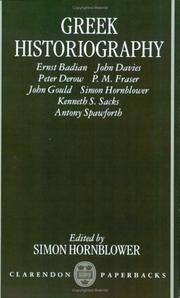
ISBN: 0198150725 019814931X 9780198149316 Year: 1994 Publisher: Oxford: Clarendon,
Abstract | Keywords | Export | Availability | Bookmark
 Loading...
Loading...Choose an application
- Reference Manager
- EndNote
- RefWorks (Direct export to RefWorks)
930.21 <38> --- Historiografie. Geschiedenis van de geschiedwetenschap--Oud-Griekenland --- -Historiografie. Geschiedenis van de geschiedwetenschap--Oud-Griekenland --- 930.21 <38> Historiografie. Geschiedenis van de geschiedwetenschap--Oud-Griekenland --- Historiography --- Greece --- History --- Historiography. --- Historiographie --- Grèce --- Histoire --- Historiography - Greece --- Greece - History - To 146 BC - Historiography
Book
ISBN: 9780198723684 0198723687 9780191035647 Year: 2018 Publisher: Oxford : Oxford University Press,
Abstract | Keywords | Export | Availability | Bookmark
 Loading...
Loading...Choose an application
- Reference Manager
- EndNote
- RefWorks (Direct export to RefWorks)
The 'Alexandra' attributed to Lykophron is a notoriously difficult poem but one that sheds crucial light on Greek religion, foundation myths, and myths of colonial identity. This book asserts its importance as a strongly political and historical document, and argues that the probable decade of its composition was a turning-point in Roman history.
Epic poetry, Greek --- Religious literature, Greek (Hellenistic) --- History and criticism. --- Lycophron --- Lycophron. --- Cassandra --- Casandra --- Cassandre --- Alexandra --- Kasandra --- Kassandra --- Kasszandra --- 卡珊德拉 --- カッサンドラー --- קסנדרה --- 카산드라 --- Касандра --- Кассандра --- كاساندرا --- Κασάνδρα --- Κασσάνδρα --- Αλεξάνδρα
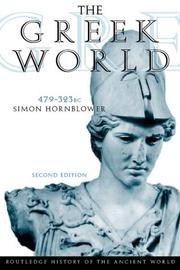
ISBN: 0415153441 Year: 2001 Publisher: London ; New York : Routledge,
Abstract | Keywords | Export | Availability | Bookmark
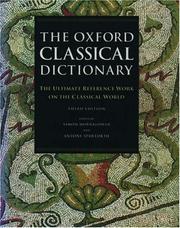
ISBN: 019866172X 9780198661726 Year: 1996 Publisher: Oxford: Oxford university press,
Abstract | Keywords | Export | Availability | Bookmark
 Loading...
Loading...Choose an application
- Reference Manager
- EndNote
- RefWorks (Direct export to RefWorks)
Ancient history --- Classical literature --- Classical dictionaries --- Dictionnaires classiques --- Klassieke woordenboeken --- Antiquité --- --Rome ancienne --- --Civilisation --- --Grèce ancienne --- --Classical dictionaries --- 930.03 --- Civilization, Classical --- Classical antiquities --- Encyclopedias and dictionaries --- History Ancient world dictionaries --- Classical dictionaries. --- --Classical dictionaries. --- Civilization [Classical ] --- Dictionaries --- History [Ancient ] --- Greece --- History --- Rome --- Rome ancienne --- Civilisation --- Grèce ancienne --- Antiquite --- Dictionnaires
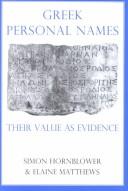
ISBN: 0197262163 9780197262160 Year: 2000 Volume: 104 Publisher: Oxford: Oxford university press,
Abstract | Keywords | Export | Availability | Bookmark
 Loading...
Loading...Choose an application
- Reference Manager
- EndNote
- RefWorks (Direct export to RefWorks)
Names, Personal --- Noms de personnes --- Congresses --- Congrès --- Greece --- Grèce --- Civilization --- Civilisation --- Onomastics --- Greek language --- Etymology --- Names --- -Names, Personal --- -Onomastics --- -Names --- Onomatology --- Language and languages --- Onomasiology --- Anthroponomy --- Baby names --- Christian names --- Family names --- Forenames --- Names of families --- Names of persons --- Personal names --- Surnames --- Classical languages --- Indo-European languages --- Classical philology --- Greek philology --- -Etymology --- Congrès --- Grèce --- Congresses. --- Names, Personal - Greece - Congresses --- Onomastics - Greece - Congresses --- Greek language - Etymology - Names - Congresses
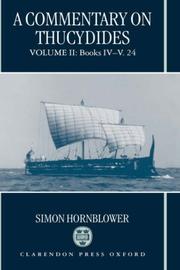
ISBN: 0198148801 019814881X 9780199594450 9780199276486 0198150997 019927648X 9780198150992 9780198148814 Year: 2008 Publisher: Oxford: Clarendon,
Abstract | Keywords | Export | Availability | Bookmark
 Loading...
Loading...Choose an application
- Reference Manager
- EndNote
- RefWorks (Direct export to RefWorks)
This is the second volume of a three-volume historical and literary commentary of the eight books of Thucydides, the great fifth-century BC historian of the Peloponnesian War between Athens and Sparta. Books iv-v.24 cover the years 425-421 BC and contain the Pylos-Spakteria narrative, the Delion Campaign, and Brasidas' operations in the north of Greece. This volume ends with the Peace of Nikias and the alliance between Athens and Sparta.A new feature of this volume is the full thematic introduction which discusses such topics as Thucydides and Herodotus, Thucydide's presentation of Brasidas, Thucydides and kinship, speech--direct and indirect--in iv-v.24, Thucydides and epigraphy (including personal names), iv-v.24 as a work of art: innovative or merely incomplete?Thucydides intended his work to be "an everlasting Possession" and the continuing importance of his work is undisputed. Simon Hornblower's commentary, by translating every passage of Greek commented on for the first time, allows readers with little or no Greek to appreciate the detail of Thucydides' thought and subject-matter. A full index at the end of the volume.
Thucydides. --- Greece --- History --- Historiography --- Thucydides --- Fukidid --- Tucídides --- Thukydides --- Thoukydidēs --- Tucidide --- תוקידידיס --- Θουκυδίδης --- -Thucydides --- Thucydide --- Thoukudides --- -Thucydides. --- Griechenland --- Grèce --- Hellas --- Yaṿan --- Vasileion tēs Hellados --- Hellēnikē Dēmokratia --- République hellénique --- Royaume de Grèce --- Kingdom of Greece --- Hellenic Republic --- Ancient Greece --- Ελλάδα --- Ellada --- Ελλάς --- Ellas --- Ελληνική Δημοκρατία --- Ellēnikē Dēmokratia --- Elliniki Dimokratia --- Grecia --- Grčija --- Hellada --- اليونان --- يونان --- al-Yūnān --- Yūnān --- 希腊 --- Xila --- Греция --- Gret︠s︡ii︠a︡ --- Histoire --- Historiographie --- Thucydides - History of the Peloponnesian War --- Greece - History - Peloponnesian War, 431-404 B.C. - Historiography --- -Thucydides - History of the Peloponnesian War
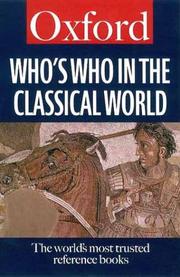
ISBN: 019172789X 0192801074 Year: 2000 Publisher: Oxford : Oxford University Press,
Abstract | Keywords | Export | Availability | Bookmark
 Loading...
Loading...Choose an application
- Reference Manager
- EndNote
- RefWorks (Direct export to RefWorks)
While books about the gods of antiquity abound, there are few works that give us entrance to the classical world as it existed in the personalities and deeds of its most important citizens. With the arrival of Who's Who in the Classical World, all this is changed. This volume holds biographical entries on nearly 500 individuals of central importance from the civilizations of ancient Greece and Rome, including writers, thinkers, artists, scientists, statesmen, kings, queens, and other historical figures. Furthermore, these entries offer far more than simple biographical information: many are short essays covering major historical and cultural themes centered around individuals as varied as Herodotus, Socrates, Plato, Alexander the Great, and Augustus. Drawing on the latest edition of the Oxford Classical Dictionary, this book offers authoritative and accessible scholarship from over 190 world experts on their subjects, providing an invaluable guide to the names and achievements of the leaders of the classical world.
Classical biography --- Mediterranean Region & Greco-Roman World --- Regions & Countries - Europe --- History & Archaeology --- Greece --- Biography --- Biographies --- Dictionaries --- Dictionnaires anglais --- Rome --- Grèce --- Antiquities --- Antiquités --- Biographie --- Dictionaries.
Book
ISBN: 9780198810643 0198810644 Year: 2017 Publisher: Oxford: Oxford university press,
Abstract | Keywords | Export | Availability | Bookmark
 Loading...
Loading...Choose an application
- Reference Manager
- EndNote
- RefWorks (Direct export to RefWorks)
The "Alexandra" attributed to Lykophron is a minor poetic masterpiece. At 1474 lines, it is one of the most important and notoriously difficult Greek poems dating from the Hellenistic period (most likely the early second century BC). Most of the poem purports to be a prophecy by the mythical Trojan princess, Kassandra, the most beautiful of the daughters of King Priam, and her prophecy ranges from the Trojan War to the Roman defeat of Macedon in 197 BC, which took place in the poet's own time. The poem's importance arises from the light which it sheds on Greek religion (in particular the role of women), on foundation myths and myths of colonial identity, and on local - espacially Italian - cults and cult places. The difficulty of the poem stems from its unusual vocabulary - many words of ancient Greek are found only in this poem - and the riddling and indirect way in which most of the many mythological characters are introduced. As well as providing the Greek text in full and its English translation, this volume provides the first ever full-length commentary in English on the poem.
Epic poetry, Greek --- Cassandra --- Lycophron. --- Translations into English. --- Cassandra (Legendary character) --- Poetry --- Translations into English --- Lycophron --- Cassandra (Legendary character) - Poetry --- Epic poetry, Greek - Translations into English --- Lycophron - Alexandra
| Listing 1 - 10 of 14 | << page >> |
Sort by
|

 Search
Search Feedback
Feedback About UniCat
About UniCat  Help
Help News
News